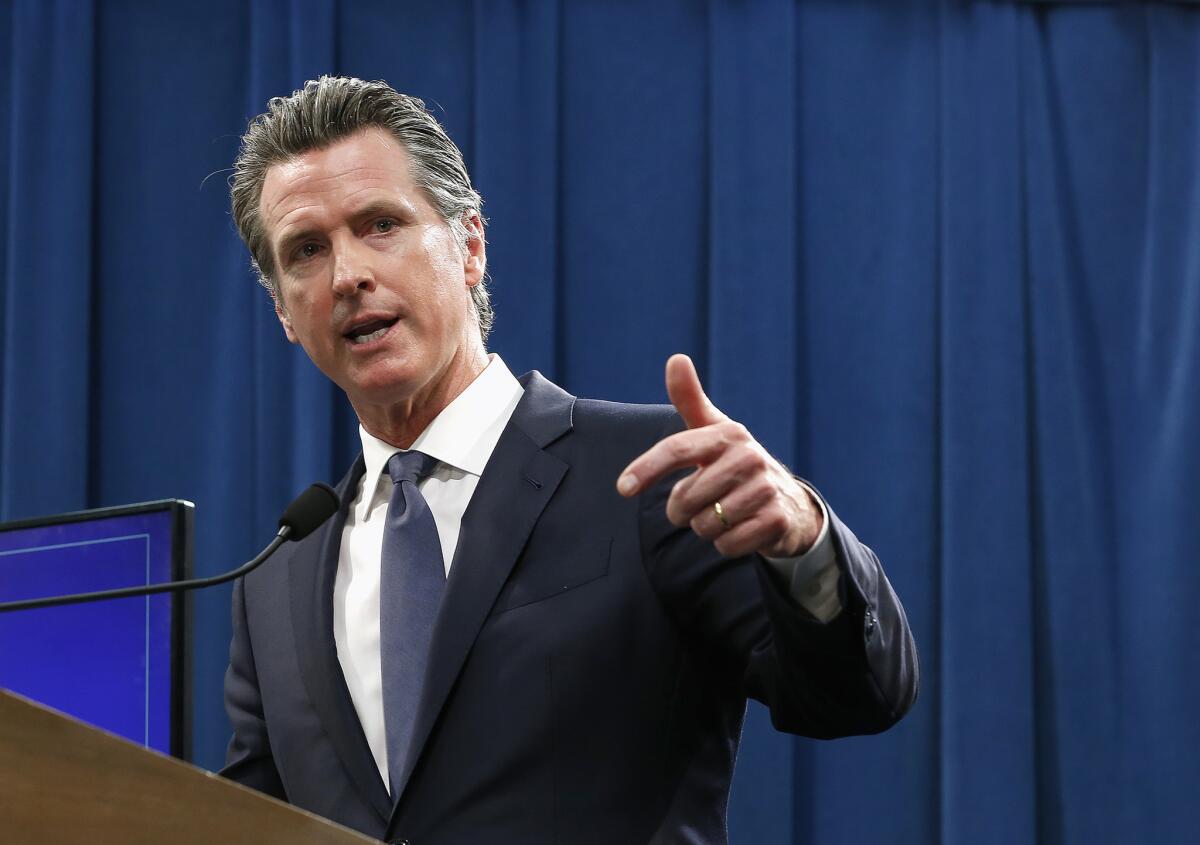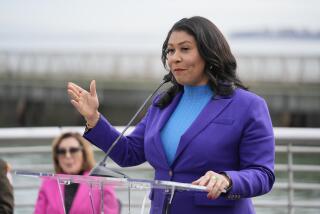Newsom endorses November ballot measure to limit Prop. 13 property tax rules

Wading into a contentious battle over the legacy of California’s landmark property tax law, Proposition 13, Gov. Gavin Newsom endorsed on Friday a November ballot measure that would make commercial property owners subject to billions of dollars in additional taxes each year.
Newsom announced his support for Proposition 15 in an email to supporters, calling the proposal “a fair, phased-in and long-overdue reform to state tax policy.”
“It’s consistent with California’s progressive fiscal values, it will exempt small businesses and residential property owners, it will fund essential services such as public schools and public safety, and, most importantly, it will be decided by a vote of the people,” the governor said in a written statement released by his political advisors.
If approved by voters in November, Proposition 15 would result in separate tax rules for commercial and residential property. Since the passage of Proposition 13 in 1978, the value of all property has been based on what it sold for when last purchased. That initiative capped property tax rates at 1% of the assessed value with annual increases of no more than 2%. Californians who hold on to their property for long periods of time end up paying significantly less in taxes than those who have bought similar property more recently.
Proposition 15 would require commercial and industrial properties, excluding those zoned as commercial agriculture, to be taxed based on current market value. It would not change the low-tax provisions of Proposition 13 for homeowners. The new ballot measure exempts some commercial property owners whose holdings are valued at $3 million or less.
Few topics have been more intensely debated by public policy experts and interest groups than whether California’s commercial property owners deserve the same low-tax protections as homeowners. An estimate by the independent Legislative Analyst’s Office found that Proposition 15 would generate as much as $12.5 billion more in tax revenues once it fully takes effect in 2025.
The ballot measure requires that 60% of the revenues go to local governments and 40% to K-12 schools and community colleges. For schools, those funds would be on top of what is already provided by taxes collected at the local and state levels.
While large corporations would see their tax liabilities rise, the opponents of Proposition 15 have instead sought to focus on what they say is the tax increase’s effect on small businesses, including those that pay property taxes as a condition of their lease.
The leading business-backed opposition campaign said Friday that Newsom’s endorsement of Proposition 15 would lead to “increased costs for the same small and minority-owned businesses he’s forced to close for the last six months.”
“Now is not the time to support the largest property tax in California history and make our cost of living crisis even worse,” a written statement from the campaign said.
With organized labor and businesses pitted against each other, a blockbuster battle over Proposition 15 is likely in store.
State campaign finance records show supporters and opponents have raised a combined $60 million — most of that coming from groups in support of the ballot measure. Few public polls have been released, though a slim majority of Californians surveyed by the nonpartisan Public Policy Institute of California supported the idea of higher taxes paid by commercial property owners.
The effort to put Proposition 15 on the Nov. 3 statewide ballot was well underway when Newsom became governor in 2019. Just days after taking office, he said he would try to broker a deal between labor and business — one that would examine a number of issues regarding the state’s tax structure.
“My desire is to use this as an exercise in bringing the parties together to see if we can compromise on a more comprehensive tax package,” Newsom said at the time.
But that effort was rarely mentioned again and no agreement was ever reached. Newsom did, however, use his endorsement of Proposition 15 to send a signal to those who have sought a variety of other tax increases — including efforts in the Legislature this summer to raise income taxes on the state’s wealthiest residents.
“In a global, mobile economy, now is not the time for the kind of state tax increases on income we saw proposed at the end of this legislative session and I will not sign such proposals into law,” he said.
More to Read
Start your day right
Sign up for Essential California for news, features and recommendations from the L.A. Times and beyond in your inbox six days a week.
You may occasionally receive promotional content from the Los Angeles Times.







